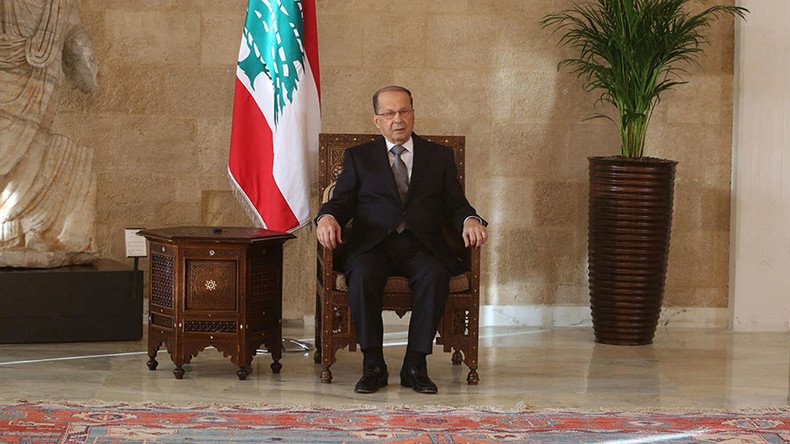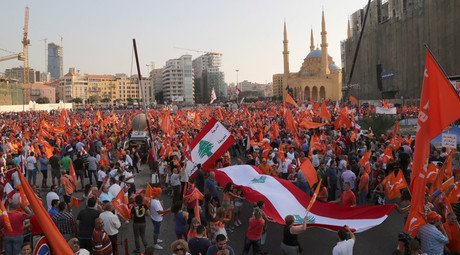Can newly elected 81-year old Michel Aoun invigorate Lebanon?

After two years of no president and a caretaker government, Lebanon has elected itself a Christian warlord as president. Few hold out much hope for great change in the country, but his approach might ease regional tensions in Syria and Yemen.
Michel Aoun is a man who inspires an entire generation of middle-aged men to grasp the nettle and embrace their 50s. At a remarkable 81-years old, the General reached the pinnacle of his career through the army ranks to finally become Lebanon’s president after a vacuum of over two years. He also sets a new standard geopolitically by being the first to really wear his Hezbollah colors on his sleeve.
In Lebanon the cat is out of the bag. It has taken one small step to becoming a country run by the Iranian-backed Shia group.
Few in Lebanon argue now that the country has become an Iranian satellite, despite the US still making this tiny country one of the leading recipients of US military aid. The Lebanese though have become accustomed to serenading numerous regional super powers.
BREAKING: @General_Aoun elected president of #Lebanon, ending years-long political stalemate https://t.co/xejTX6k9il#LebanonElectionpic.twitter.com/niv0oRZwdL
— Sputnik (@SputnikInt) October 31, 2016
For Aoun it will be the same. His Hezbollah colors are more likely to be deal breakers in the region more than within Lebanon itself, although his own people talk about fixing Lebanon first with such unfettered determination.
Aside from Aoun’s triumphant supporters who see major areas ripe for reform, both with outdated electoral laws being overhauled as well as corruption and lawlessness in the country, Aoun has a real opportunity to take the edge off Hezbollah’s (and Iran’s) geopolitical zeal – which so far has alienated Tehran from talks with the Saudis.
Aoun’s a Christian who wants to return relations with Saudi Arabia back to normal. Ironically, it was his own son-in-law as foreign minister who failed to support Riyadh during a critical moment of tension with Tehran when the latter’s embassy in the Iranian capital was being ransacked in January of this year, following the execution of a Shia leader in the Kingdom sparking hue and cry.
Aoun’s strength is not his diplomacy or public speaking. He is as humorless, prone to tantrums and almost emulates a man at the end of his life, who can’t believe his luck. 81 is, after all, an age which doesn’t bode well in a country where there’s a lot to fix.
Yet it’s his ability to forge ties with even old foes and heading straight for the Saudis is a smart move. By contrast, many of his own followers though are pondering over whether Bashar Assad will come to Beirut to congratulate him. His victory at seizing the Presidential seat is not his alone, as being a strong ally of both Hezbollah and Syria helped in the final call and convinced many in Lebanon that a compromise candidate was better than none.
“We’re at the point where we can accept any president” exhales Soumaya, a 40-year old Sunni bank clerk who wouldn’t normally support Aoun. “I understand why Hariri did it. We’re out of options and time” she explains almost breathless.
Saad Hariri, Saudi Arabia’s maestro in Lebanon initially did everything he could to try and not agree to the deal which will also place him back in the PM’s job. Some argue in Lebanon that Hariri’s businesses are having cash flow problems and so he has put him back into a powerful seat to assist the ailing ventures. This is the Middle East after all.
But his relationship with Aoun is critical for both the stability in Lebanon and for attempting to accelerate peace in the region, both in Syria and even Yemen and there is much hope that Aoun will not be at the helm while Hariri takes the rudder on a vessel may well actually go round in circles and never leave the port.
Yet regionally there is also hope, perhaps more so. This tiny country, with a coalition government of two political blocs which are poles apart, could well set the template for a series of new Iran-Saudi peace talks at a critical juncture where the war in Syria really needs an amicable conclusion.
If the Saudis can begin to talk to Hezbollah’s chief prodigy, then anything is possible. Perhaps they might regard Beirut as a place to start, using the Lebanese presidency as a conduit for failed talks which have led to the Syria war dragging on. Many argue after all that Lebanon not having a president for over two years led to this tiny country playing a critical role in the war raging in the first place. The fiasco of a porous border which allowed both Sunni extremist groups from Tripoli and Hezbollah fighters to cross it at will and carry out raids, might not have happened under a strong government and a military type leader who could have nipped the problem in the bud. The same could be applied to hostages from Lebanese forces and Police who were kidnapped there in the summer of 2014.
Aoun is not going to withdraw Hezbollah soldiers from Syria though despite much talk among his own coterie of advisers about making Lebanon like Ireland of the entire region. Neutrality is seen as the key to getting Saudi tourism dollars pumping back into the economy and creating stability.
We congratulate the #Lebanese people and President @General_Aoun on today’s election and this moment of opportunity for #Lebanon
— U.S. Embassy Beirut (@usembassybeirut) October 31, 2016
Instead of welcoming Assad to visit him, it might be wise for him to make a statement to all groups in Lebanon that Syria will have to be ‘another country’ and its leader persona non grata until the war is over. Hariri has already said that none of his new government ministers will visit there or work with Damascus and so such a move would be wise in setting a new mantra.
In the coming days, some commentators are expecting announcements from Aoun on how he is going to restore a number of privileges for the Christians of Lebanon as Hezbollah will grant him some ‘payback’.
Aoun was in exile for 15 years when an invasion of the Syrian army into Lebanon at the end of the civil war led him to flee to France. Returning in 2005, he gave the impression as an opportunist figure when he then started to work with the Syrians as allies in the region. This about turn doesn’t seem to have given him a craven political patina, more one of a wizened survivor in a period where Lebanon badly needs a leader who can create stability and put the country first over its regional ties.
But Aoun has some outdated characteristics which are sure to raise their ugly heads in the coming months. He has almost a loathing of Lebanon’s relatively free media and perhaps the price of stability the country will have to pay is many of Lebanon’s firebrand journalists taking the King’s shilling and reverting to the model of a monolithic singular press state where hacks have little choice than to work like PR agents of the elite. If he can get Saudi Arabia to pay the salaries of Lebanese journalists who haven’t been paid for almost a year now, it might win him a few points. Just clearing 20 million tons of garbage, keeping the lid on corruption and stabilizing the economy will score him many more in his honeymoon period of nine months or so, before parliamentary elections next May.
The statements, views and opinions expressed in this column are solely those of the author and do not necessarily represent those of RT.














